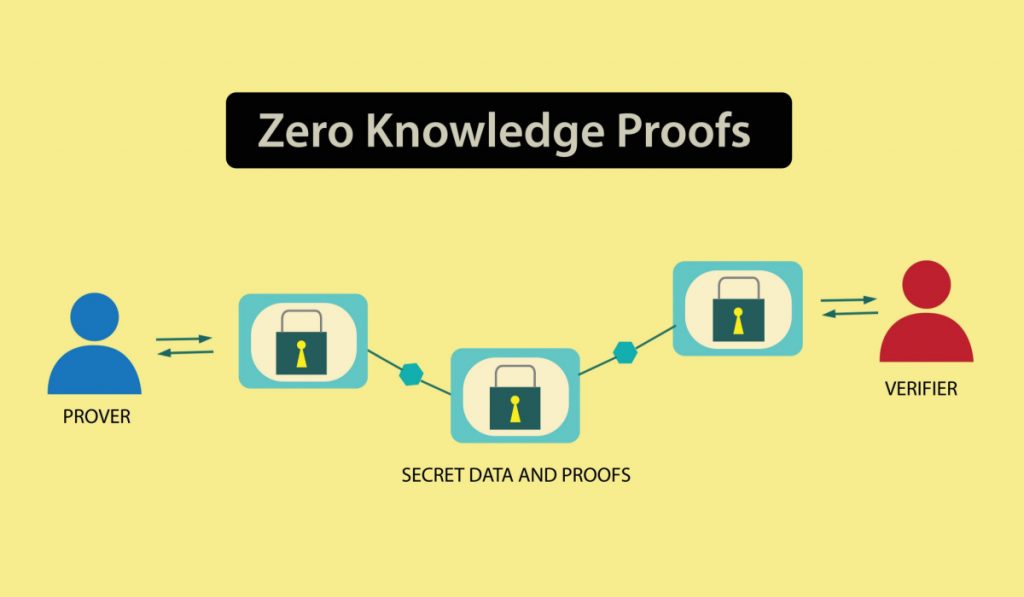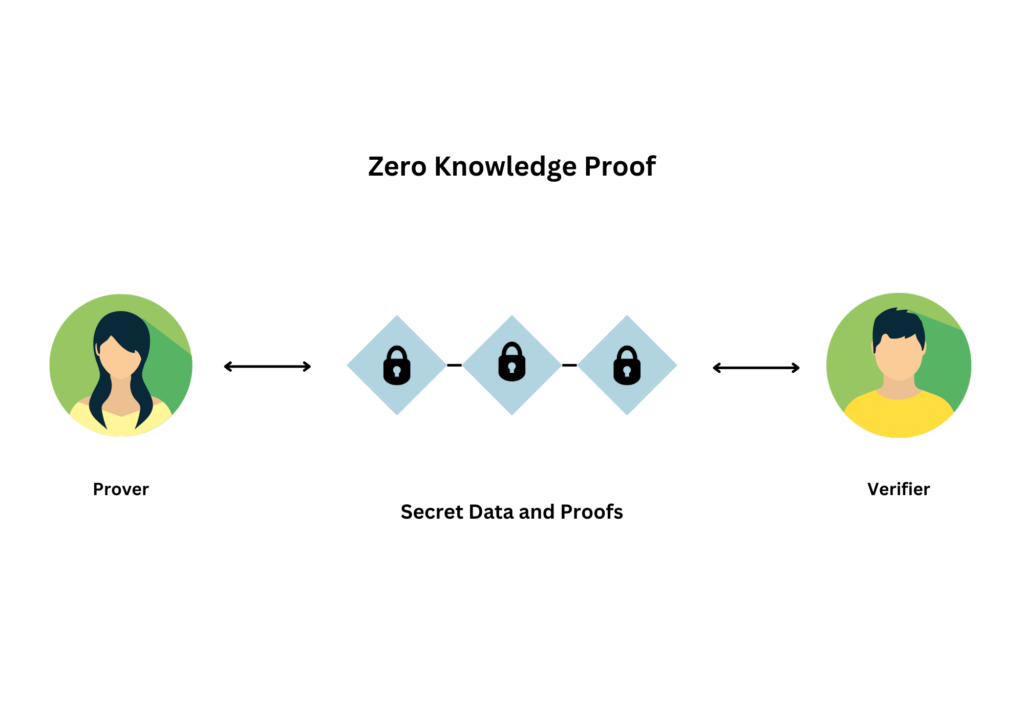Imagine proving you know a secret without revealing it. Sounds like magic, right? That’s exactly what zero-knowledge proofs (ZKPs) do in blockchain technology. Used in networks like Zcash and Ethereum, ZKPs enhance privacy and security without compromising trust. This beginner-friendly guide explains what zero-knowledge proofs are, how they work, and why they’re a game-changer for developers building decentralized apps (DApps). Let’s dive in!

What Are Zero-Knowledge Proofs?
A zero-knowledge proof is a cryptographic method that allows one party (the prover) to prove to another (the verifier) that a statement is true without revealing any additional information. In simpler terms, it’s like proving you’re over 21 without showing your ID—just convincing the verifier you meet the requirement.
ZKPs have three key properties:
- Completeness: If the statement is true, an honest prover can convince the verifier.
- Soundness: If the statement is false, no dishonest prover can fool the verifier.
- Zero-Knowledge: The verifier learns nothing beyond the fact that the statement is true.
In blockchain, ZKPs enable private transactions, secure identity verification, and more.
Why Zero-Knowledge Proofs Matter for Blockchain
Blockchains are transparent by design—everyone can see transactions on networks like Bitcoin or Ethereum. While this ensures trust, it compromises privacy. ZKPs solve this by enabling:
- Private Transactions: Hide transaction details like sender, receiver, or amount.
- Scalability: Reduce on-chain data with compact proofs, speeding up networks.
- Secure Authentication: Verify identities or credentials without exposing sensitive data.
For developers, ZKPs are a powerful tool to build privacy-focused DApps for finance, healthcare, or identity management.

How Zero-Knowledge Proofs Work
Let’s break down ZKPs with a simple analogy and then dive into the technical details.
The Cave Analogy
Imagine a cave with a locked door that only opens with a secret code. You want to prove to a friend you know the code without revealing it. You enter the cave, pass through the door, and exit from another path. Your friend sees you emerge, proving you know the code, but learns nothing about the code itself. This is a zero-knowledge proof!
Technical Mechanics
In blockchain, ZKPs use complex math to achieve this. The most common types are:
- zk-SNARKs: Zero-Knowledge Succinct Non-Interactive Argument of Knowledge. These are fast, compact proofs used in Zcash and Ethereum rollups.
- zk-STARKs: Zero-Knowledge Scalable Transparent Argument of Knowledge. More scalable but larger in size, used in advanced scaling solutions.
How It Works:
- The prover generates a mathematical proof that a statement (e.g., “I own 10 ETH”) is true using a secret (e.g., private key).
- The proof is sent to the verifier, who checks it using a public verification key.
- If valid, the verifier accepts the proof without learning the secret.
zk-SNARKs, for example, rely on elliptic curve cryptography and trusted setups to create these proofs efficiently.
Zero-Knowledge Proofs in Blockchain: Real-World Examples
ZKPs are already powering major blockchain projects. Here are some key use cases:
- Zcash: Uses zk-SNARKs to enable private transactions, hiding sender, receiver, and amount while ensuring validity.
- Ethereum Rollups: ZK-Rollups like zkSync and StarkNet use ZKPs to bundle thousands of transactions off-chain, settling them on Ethereum with a single proof.
- Identity Systems: Projects like uPort use ZKPs to verify credentials (e.g., age or citizenship) without exposing personal data.
These examples show ZKPs’ versatility in privacy and scalability.

Building a ZKP-Powered DApp: A Simple Example
Let’s create a basic DApp that uses zk-SNARKs to verify a private transaction. We’ll use the ZoKrates toolkit to generate and verify proofs on Ethereum.
Step 1: Set Up Your Environment
Install the necessary tools:
- Node.js: Download from nodejs.org.
- Hardhat: Install via
npm install --save-dev hardhat. - ZoKrates: Follow setup at zokrates.github.io.
- MetaMask: Install from metamask.io.
Create a Hardhat project:
npx hardhat
npm install @openzeppelin/contracts
Step 2: Write a ZKP Program with ZoKrates
Create a ZoKrates program (proof.zok) to prove a simple statement, like “I know a number whose square is 16” without revealing the number (4).
def main(private field a) -> field {
return a * a;
}
Compile and generate a proof:
zokrates compile -i proof.zok
zokrates setup
zokrates compute-witness -a 4
zokrates generate-proof
This outputs a Solidity verifier contract and a proof file.
Step 3: Deploy the Verifier Contract
Copy the generated verifier contract to contracts/Verifier.sol. Deploy it to Sepolia using a Hardhat script (scripts/deploy.js):
const hre = require("hardhat");
async function main() {
const Verifier = await hre.ethers.getContractFactory("Verifier");
const verifier = await Verifier.deploy();
await verifier.deployed();
console.log("Verifier deployed to:", verifier.address);
}
main().catch((error) => {
console.error(error);
process.exitCode = 1);
});
Run with npx hardhat run scripts/deploy.js --network sepolia.
Step 4: Create a Front-End
Build a React app to interact with the verifier. Create a new app:
npx create-react-app zkp-dapp
cd zkp-dapp
npm install ethers
Replace src/App.js with:
import { useState } from 'react';
import { ethers } from 'ethers';
import './App.css';
const verifierAddress = 'YOUR_VERIFIER_CONTRACT_ADDRESS';
const verifierABI = [/* YOUR_VERIFIER_ABI */]; // From ZoKrates
function App() {
const [account, setAccount] = useState(null);
const [proof, setProof] = useState(null);
const connectWallet = async () => {
if (window.ethereum) {
const provider = new ethers.BrowserProvider(window.ethereum);
const accounts = await provider.send('eth_requestAccounts', []);
setAccount(accounts[0]);
} else {
alert('Install MetaMask!');
}
};
const loadProof = async () => {
const proofData = require('./proof.json'); // Generated by ZoKrates
setProof(proofData);
};
const verifyProof = async () => {
if (!account || !proof) return;
const provider = new ethers.BrowserProvider(window.ethereum);
const signer = await provider.getSigner();
const contract = new ethers.Contract(verifierAddress, verifierABI, signer);
const { proof: { a, b, c }, inputs } = proof;
const result = await contract.verifyTx(a, b, c, inputs);
alert(result ? 'Proof verified!' : 'Invalid proof');
};
return (
ZKP DApp
{!account ? (
Connect Wallet
) : (
Connected: {account}Load ProofVerify Proof
)}
);
}
export default App;
Add styling in src/App.css:
.App {
text-align: center;
padding: 50px;
font-family: Arial, sans-serif;
}
button {
padding: 10px 20px;
margin: 10px;
cursor: pointer;
background-color: #0288d1;
color: white;
border: none;
border-radius: 5px;
}
button:hover {
background-color: #0277bd;
}
Copy proof.json from ZoKrates to the src folder. Run with npm start. Connect MetaMask to Sepolia, load the proof, and verify it on-chain.
Benefits of Zero-Knowledge Proofs
ZKPs offer significant advantages for blockchain:
- Enhanced Privacy: Protect user data in transactions or identity systems.
- Improved Scalability: Compact proofs reduce on-chain data, speeding up networks.
- Versatility: Applicable to finance, healthcare, voting, and more.
These benefits make ZKPs a cornerstone of modern blockchain innovation.
Challenges of Zero-Knowledge Proofs
Despite their power, ZKPs have limitations:
- Computational Complexity: Generating proofs is resource-intensive, especially for zk-SNARKs.
- Trusted Setup: zk-SNARKs require a trusted setup, which can introduce risks if compromised.
- Learning Curve: Implementing ZKPs requires advanced cryptographic knowledge.
Tools like ZoKrates and libraries like Circom simplify ZKP development.
Tips for Developers Using ZKPs
To build ZKP-powered DApps effectively:
- Start Simple: Use ZoKrates for basic proofs before tackling complex systems.
- Leverage Libraries: Use snarkjs or Circom for zk-SNARK development.
- Test Thoroughly: Verify proofs on testnets like Sepolia using Hardhat.
These practices ensure your ZKP DApps are secure and efficient.
Resources for Learning More
Deepen your ZKP knowledge with these resources:
- Zcash Docs: zk-SNARKs explained at z.cash.
- Ethereum Scaling: ZK-Rollups at ethereum.org.
- Blockchain Communities: Join discussions on Ethereum Stack Exchange or Zcash forums.
Stay curious to master zero-knowledge proofs.
Conclusion
Zero-knowledge proofs are revolutionizing blockchain by enabling privacy and scalability without sacrificing trust. From Zcash’s private transactions to Ethereum’s ZK-Rollups, ZKPs are reshaping decentralized technology. With the ZoKrates DApp example, you’ve seen how to implement ZKPs practically. Keep exploring ZKP tools and use cases, and share your privacy-focused DApp ideas in the comments below!






















